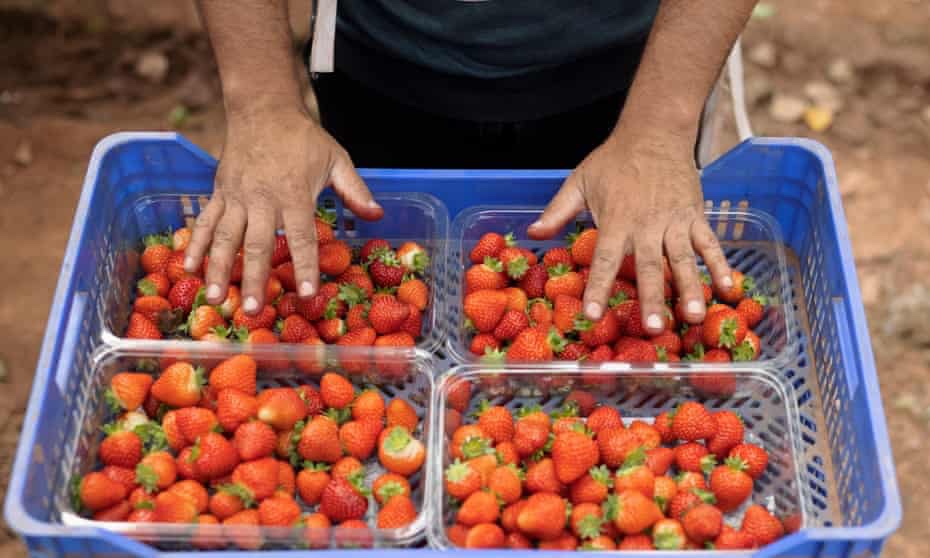Find copied below links to another three instalments by Emily Dugan at The Guardian on the severe forced labour risks in the UK government’s failing seasonal worker scheme, with the focus on Nepali and Indonesian workers recently migrating at extortionate cost to the UK agricultural sector. I also include the previous stories below at the bottom of this post for reference.
Hundreds of Indonesian fruit pickers in UK seek diplomatic help
Exclusive: More than 200 people have approached Indonesian embassy since July to report difficulties faced
The seasonal worker visa allows people to come to the UK for up to six months and work but there is no guarantee of employment for that period. Photograph: SNS Group

Fri 2 Dec 2022
More than 200 Indonesian fruit pickers have sought diplomatic help since July after facing difficulties working in Britain this season, the nation’s embassy has revealed.
The Guardian has spoken to a pair of workers sent to a farm in Scotland that supplies berries to M&S, Waitrose, Tesco and Lidl. They claim pickers were sent back to the caravan if they could not work fast enough and left with large debts to repay.
The embassy says the true number of people experiencing problems is likely to be far higher, as many were seeking help on behalf of several workers at the same farms – and others would not have the confidence to approach the embassy.
‘I’m ashamed’: working in UK leaves fruit pickers from Indonesia in debt
It says the most common reported problem is a lack of work at farms, especially for those who arrived very late in the season. Some did not start until the harvest was all but over, giving them little opportunity to repay debts incurred when they signed up.
The seasonal worker visa allows people to come to the UK for up to six months and work but there is no guarantee of employment for that period.
One man who started at Castleton farm in Aberdeenshire in July said he was repeatedly sent back to the caravan after just a few hours in the field because he could not meet challenging picking targets, leaving him badly in debt.
The Indonesian worker said he had borrowed money in April to pay a local agent in Java more than £4,650 to come to Britain. The man said the small amounts of work he was given in Scotland meant he typically took home about £200 a week, which made little impact on his debts.
He was eventually dismissed after two months as a result of red warnings for working slowly and moved to a farm in Kent. The work there only lasted until the start of November, leaving him more than £1,700 debt and with no job.
The British Retail Consortium said that supermarkets sourcing from Castleton “are concerned by these allegations and are investigating as a matter of urgency”.
Seasonal worker visa puts migrants at risk of exploitation, say supermarkets
Ross Mitchell, the managing director of Castleton Fruit, said he could not comment on specific cases but that the farm did “have a disciplinary procedure, like all employers do to deal with performance- related issues” that was audited annually and heavily regulated. He said worker wellbeing was of the “utmost importance” and that it emploed nearly 1,000 people each year, of whom more than 70% returned.
Mitchell said the farm had 106 workers this year from Indonesia, 70 of whom were still there. He said they worked an average of 41.81 hours, with an average weekly gross pay of £450.68, before charges such as accommodation costs were taken.
Mitchell said the farm was concerned about “payment demanded by third-party agents” and that they relied on “approved agents to have carried out due diligence to ensure that the workers are not paying excessive fees”.
Mitchell said they first became aware of the charges made to workers once they were already at the farm and they “were very concerned” and immediately reported it to the agent, the authorities and customers. He added: “We had hoped the relevant bodies would have dealt with this issue.”
More than 1,450 Indonesians have come to Britain under the seasonal worker visa, according to the latest figures. They were supplied by AG Recruitment, one of four UK agencies licensed to recruit using the scheme.
The Gangmasters and Labour Abuse Authority (GLAA) has been investigating AG’s Indonesian recruitment since the Guardian revealed in August that workers reported taking on debts of up to £5,000 by unlicensed foreign brokers to work in Britain for a single season. AG denied any wrongdoing and said it knew nothing about Indonesian brokers charging money.
An embassy official who has been running support for workers in the UK said initially people sought help with their immigration status because they thought the visa could be transferred to other work. “Then they started coming to us with problems about the targets on farms,” they said.
The official said a small number also reported problems with living conditions in caravans, particularly as the weather got colder. They added: “Currently most people are contacting us because there’s no more work at the farms. They try to transfer but AG tells them there’s no other work.”
The Guardian has previously reported that AG had no prior experience in Indonesia and sought help from the Jakarta-based Al Zubara Manpower, who in turn went to brokers on other islands who charged exorbitant fees to the people they introduced, according to one Al Zubara agent.
AG’s director, Douglas Amesz, said: “Workers should never pay fees to anyone to receive a job in the UK; this is UK law. However, unfortunately this is not law in all the countries we have historically recruited from so we are actively working to educate citizens abroad that they should never pay anyone fees to receive a job in the UK or anywhere else.”
AG said it had been working closely with the embassy while the Indonesian workers had been in the UK and that it did not recognise the figure of more than 200 seeking help. It said AG had “assisted a fraction of the number” and that “the vast majority of workers have had very minor issues”.
Yulia Guyeni, the director of Al Zubara, said she had “no knowledge” of brokers charging more than the agreed amount for flights and visas. She said AG was responsible for looking for farms in the UK and that “we send workers based on the request from AG”.
Guyeni claimed that on the issue of overcharging the Indonesian government had investigated “and concluded that we have not done any wrongdoings”.
Guyeni added that “we only charge based on the placement agreement the workers signed” and that they should have known the right cost because it was on the paperwork. She said of the debts: “It is not our responsibility as we do not encourage them to have debt. They are old enough and should be responsible to realise the consequences of debt.”
A GLAA spokesperson said: “Where there are allegations of labour exploitation we will investigate and take appropriate action if our licensing standards are not being fully adhered to … Scheme operators are fully aware of their responsibilities to workers.”
Seasonal worker visa puts migrants at risk of exploitation, say supermarkets
Industry fears hastily designed scheme is leading to human rights abuses and debt bondage in supply chains
The scheme was created to create a cheap supply of workers on six-month visas so British farms could plug labour shortages after Brexit. Photograph: Neil Hall/EPA

Fri 2 Dec 2022 10.01 GMT
Britain’s hastily designed seasonal worker visa is causing a headache for supermarkets, which are concerned its structure is incompatible with their public pledges on preventing human rights abuses and debt bondage in their supply chains.
All the big supermarkets have been holding urgent roundtable meetings with growers and others in the industry over the past month to try to find a way of preventing workers from being further exploited under it.
The scheme was created to create a cheap supply of workers on six-month visas so British farms could plug labour shortages after Brexit. But many in the industry are concerned its structure is putting vulnerable migrants at risk of exploitation.
Charging recruitment fees is against the law but it is within the rules of the visa for workers to bear the vast cost of international flights and visas, which can put them thousands of pounds in debt, even when no illegal fees are charged.
David Camp, the director of the Association of Labour Providers, said: “We’ve been asking for significant changes to the scheme for years. What I find unfortunate is that it takes people to suffer before action is taken.”
Camp said the government needed to take early decisions about visa allocation so recruiters could put in proper time to sourcing workers carefully. He also said the scheme rules needed to be redesigned.
“We should have a system where workers don’t have to go into debt to come and work in the UK. That should be a given,” he said.
Camp says an example of the lack of planning was the extra 8,000 visas issued under the scheme at the end of June, meaning once workers were sourced and brought to Britain there was little left of the harvest to work on and pay back the cost of travelling here.
When the visa was piloted to prepare for Brexit in 2019, just 2,500 workers were brought over on it. Since then it has expanded rapidly. More than 33,000 people had come to Britain on the scheme this year by September, according to Home Office data.
While zero-hours contracts are banned under the scheme, there are no agreed minimum hours, nor a guarantee of employment for the full six months of the visa.
Dr Dora-Olivia Vicol, the chief executive of the Work Rights Centre, said: “The fact that seasonal workers are still indebted after months of precarious employment shows that some farms treat them like zero-hours workers in all but name.
“There is also a risk that indebted migrant workers will feel like they have no choice but to recoup their costs by staying on to work on the black market, where exploitation is rife. To protect migrant workers from exploitation, we need a seasonal worker visa where hours and duration of work are guaranteed.”
A Home Office spokesperson said they would take action where abuse was reported and proven. They added: “The seasonal workers route has been running for three years and we continue to work to prevent exploitation and clamp down on poor working conditions while people are in the UK.
“We continue to work closely with scheme operators, who have responsibility for ensuring the welfare of migrant workers, preventing zero-hour contracts and managing the recruitment process overseas.”
‘I’m ashamed’: working in UK leaves fruit pickers from Indonesia in debt
Workers tell of paying thousands of pounds to brokers for jobs that yield meagre wages
Agung was expecting six months of well-paid farming work in Britain. Photograph: Sam Frost/The Guardian

Fri 2 Dec 2022 10.01 GMT
When Agung* arrived at Heathrow airport in July, he thought it marked the start of a better financial future for his family.
He was expecting six months of lucrative farming work in Britain to help support his mother and siblings back home in Java. He did not realise the harvest was already well under way – or that the pay would be a fraction of what he hoped.
Agung said he paid more than £4,650 to a broker in Java for the job back in April and took on a loan with 3% monthly interest to fund it. His visa finally came through in June but he did not travel for another month.
His first job was at Castleton farm in Aberdeenshire, which supplies berries to supermarkets including M&S, Waitrose, Tesco and Lidl. He had not realised it was so far from London and was shocked when he had to pay £95 to get there, adding to his growing debt.
Once he started picking berries he found the targets impossible to meet. He said they would start work at around 5am and if he had not picked enough by 9am, he was sent back to the caravan for the day. Typically he said this meant he took home little more than £200 a week.
Instead of the riches he hoped for, Agung skipped meals to try to make headway repaying the debt. “I transferred almost all the money I earned to Indonesia,” he said. “Sometimes I did not have enough food for me because all I can think is that I have to pay my debt.”
By September, Agung had been dismissed because he had three warnings resulting in days off for being too slow. He said he made about £1,500 in two months.
“My family really need money. What I got was not enough to help them,” he said.
He paid for his own transport to Kent and started picking apples on another farm. But at the start of November that work stopped because “there was no more fruit to be picked”.
He moved to London with a friend and managed to rent a room, wondering whether to take his chances on the black market or fly home early. He said he still owes more than £1,700 back home and is being charged 3% interest a month.
“I feel some of the treatment is quite unfair,” he said. “There’s no more work but we’re still in debt.”
Ross Mitchell, the managing director of Castleton Fruit, said that the farm did “have a disciplinary procedure, like all employers do to deal with performance-related issues” that was audited annually and heavily regulated.
He said worker wellbeing was of the “utmost importance” and that, of the nearly 1,000 people it employed each year, more than 70% returned. He added that the 106 Indonesians who came to the farm this year worked an average of 41.81 hours, with an average weekly gross pay of £450.68 (before costs such as accommodation were charged) and 70 were still at Castelton.
Mitchell said the farm was concerned about “payment demanded by third-party agents” and that it relied on “approved agents to have carried out due diligence to ensure that the workers are not paying excessive fees”.
Mitchell said they first became aware of the charges made to workers once they arrived at the farm and that they “were very concerned” and immediately reported it to the agent, the authorities and customers. He added: “We had hoped the relevant bodies would have dealt with this issue.”
Mochtar* from Lombok, who worked alongside Agung, is also still in debt over what he paid to come to Britain. He managed to pick more fruit at Castleton but says he still made roughly £300 a week.
He said he only managed to send about £100 home to his wife a month, once he had made payments against debts and factored in his own cost of living. The debt hangs over his excitement at returning home.
“I will be so happy to see my family again,” he said, “but on the other side I’m ashamed.”
* Names have been changed to protect identities.
Past/recent stories on challenges of UK seasonal worker scheme
2. Review of UK seasonal worker visas to increase risk of slavery, experts warn (29th Sept 2022)
3. Indonesians wait on UK farm jobs after paying deposits of up to £2,500 (25th Sept 2022)
4. ‘Our fate is unclear’: Indonesian man who paid £1,000 deposit for UK farm job (25th Sept 2022)
5. Rapid expansion of visa scheme leaves seasonal workers at risk of exploitation (25th Sept 2022)
7. Revealed: Indonesian workers on UK farm ‘at risk of debt bondage’ (14th August 2022)
8. ‘My family need my support to eat’: how Indonesians came to work on a Kent farm (14th August 2022)
9. Why UK farms are recruiting fruit pickers from 7,000 miles away (14th August 2022)